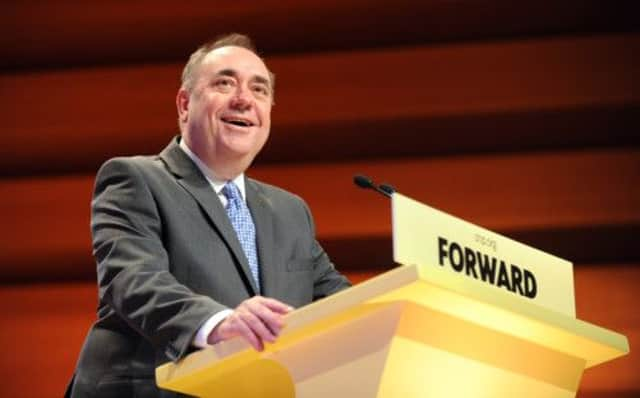Leaders: Referendum shifts up a gear | True Scots hero


Yesterday at the SNP conference in Perth, there were no such problems. The First Minister was impressive in his focus, and also in the calm and measured way he spelled out his vision for Scotland becoming an independent country. This was not independence as revolution, nor independence as insurrection. This speech required no woad, metaphorical or otherwise. Instead, Salmond portrayed independence as a natural progression for a confident Scotland at ease with the notion that it should be in charge of its own affairs, in its own country. It was the SNP leader’s most impressive performance for some years.
Salmond’s speech illustrated how the nature of the pro-independence campaign has changed in recent weeks. The emphasis has moved away from the “let a thousand flowers bloom” approach promoted by the umbrella YesScotland organisation. It had been telling voters anything was possible in the new Scotland, including a radical realignment of politics that gave new prominence to voices on the left. While this was popular among groups such as the Scottish Greens, Scottish Socialists and sundry factions on the radical fringes of Scottish politics, it was far from the concerns and comfort zone of the vast majority of Scots. And yet, encouraged by YesScotland chief executive Blair Jenkins, it seemed to dominate the discourse on independence. Damagingly, it was completely at odds with the approach of the mainstream independence party, the SNP.
Advertisement
Hide AdAdvertisement
Hide AdNow, with key SNP figures such as spin doctor Kevin Pringle now based in the Glasgow HQ of YesScotland, the party’s priorities are front and centre in the pro-independence push. And the SNP message has itself changed. For most of this year the argument from Nationalist ministers has been a largely philosophical one: putting the case that Scots should be in charge of their own affairs, and that Westminster was failing to govern in accordance with Scottish priorities. This has now been replaced by an approach that is far more practical, offering a glimpse of the tangible benefits the SNP says would be available to Scots under independence. The promises are now coming thick and fast: with independence we could retire earlier; we would have lower fuel bills; and now, after yesterday’s speech, we would have a higher minimum wage. The phrase “retail politics” is usually used disparagingly, but in its two Holyrood election victories the SNP has shown it can work. It is now clear that the SNP has decided to fight the independence referendum in much the same way it fights normal parliamentary elections – with a manifesto of practical policies put to the voters by a political party. It makes all the more sense when one considers that the SNP – in recent years anyway – has been consistently more popular than the idea of independence itself. The main vehicle in the push for independence will now be the SNP, not the official YesScotland campaign.
This poses a problem for Better Together, as the No campaign prefers to call itself. Faced with SNP promises on cost-of-living and quality-of-life issues, it cannot counter in kind. It cannot offer unionist goodies in the way the SNP offers nationalist goodies. Better Together is not set up to do this. It can only rebut. It is in danger of being left making a philosophical case for the Union while the SNP offers a goody-bag full of practical benefits that will come, it says, from independence. The referendum has entered a new and fascinating phase.
A true Scottish hero
IN THE litany of great Scottish scientists the name Ian Frazer is not, perhaps, the most instantly recalled. The Scots-born immunologist has spent most of his career in Australia, and his success is not widely recognised in his home country. It is time this changed. Professor Frazer, who developed a groundbreaking vaccine for cervical cancer, deserves to be acknowledged as one of the most significant Scottish scientists of his age. As a new biography makes clear, this is a man who could be said to have saved a million lives. He deserves to be talked about in the same breath as other life-saving Scottish pioneers such as Alexander Fleming.
The full benefits of his work are still to be seen, not least here in the country of his birth. It is only in the past few years that teenage Scottish schoolgirls have been routinely inoculated against cervical cancer – a great leap forward that only came after difficult negotiations with faith groups. It is surely only a matter of time before teenage Scottish boys, too, are also inoculated against the HPV virus that plays a key role in the spread of the disease.
Professor Frazer’s relative obscurity is due in no small part to his modesty. He would prefer his work spoke for itself. A grateful world may, however, want to persuade him to step for a moment into the limelight, where he can receive our thanks.